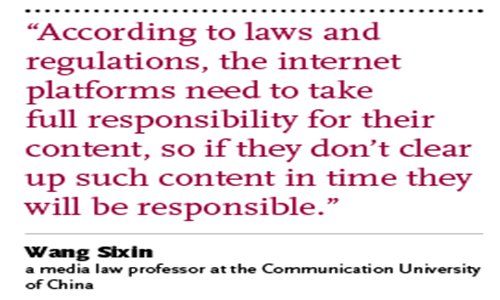Chinese media platforms take preemptive measures to close potential trouble-making accounts
Global Times
1527608877000
○ Several popular Chinese bloggers have had their accounts suspended for insulting heroes or spreading controversial values
○ Many sites are now voluntarily cleaning up their own content
○ Concerned netizens and organizations have taken the initiative to supervise online content and report wrongdoings

Photo: VCG
When news came out that Weibo, a Chinese Twitter-like microblogging website, had banned popular blogger Ayawawa for six months, it felt like a carnival had instantly broken out online."What a joyous occasion," one netizen wrote online. "I'm sure millions (of netizens) have been reporting her to Weibo managers for a long time. Such poison to society should be banned for a lifetime."
The 35-year-old blogger, whose real name is Yang Bingyang, has more than three million followers on Weibo. She identifies herself as a relationship writer and sells make-up and skin care products online.
Ayawawa had long been criticized for her controversial relationship theories, in which she promotes that women must increase their "mate value" in order to attract men who are willing to "invest" in marriage.
She often went into specifics, teaching her followers that "you should wear attractive red on your first date, sportswear on the second and sexy black lace on the third." She is also listed as a top female consultant at a popular pickup artist website.
But what sent Ayawawa over the edge was a commentary related to China's "comfort women," ordinary women who were gang raped and forced into sex slavery during the Japanese invasion in the 1930s and 40s.
"Though women were raped, at least they had a chance to survive and to witness history," she wrote on Weibo.
After her words were exposed by media, many flooded Weibo to condemn her. Finally, Weibo took official measures.
"In view of the vast influence the blogger has and the adverse social influence she has caused, we have decided to ban Ayawawa from posting and from being followed on Weibo for six months," Weibo announced.
Ayawawa is not the first Chinese blogger that has been banned on non-governmental channels due to her words and actions. Recently, a slew of other accounts have suffered blows due to inappropriate speech or views.

Series of closures
In a recent sweep of harmful online information that damages the image of China's national heroes and martyrs, Weibo shut down 16 bloggers, including the popular account "Baozoumanhua."
The account was reported by media as having insulted Chinese war martyrs. A minute-long video released on news aggregate website Jinri Toutiao on May 8 showed Baozoumanhua saying Dong Cunrui, a famous army hero who sacrificed his life carrying explosives into an enemy bunker, only sacrificed himself to blow up the enemy's fortress "because this is my hamburger" (a line from a recent KFC advertisement).
In the same clip, the host switched the words of a famous poem written by deceased general Ye Ting when he was imprisoned, replacing "I'll give you freedom" with "painless abortion," Chinese words that sound similar.
On May 16, Jinri Toutiao released a notice saying it received reports that Baozoumanhua had released videos demeaning war heroes and martyrs. The website said it will "launch a special reexamination campaign throughout the website over content related to heroes and martyrs and welcomes reports of any rule-breaking action from all walks of society that help Jinri Toutiao purify the cyberspace."
In reply, Baozoumanhua's host, Wang Nima, wrote an official Weibo post arguing his video targeted inappropriate advertisements, such as "painless abortions," which can be seen posted everywhere, not at the martyrs themselves.
But it was already too late. Baozoumanhua was quickly met with a series of account closures, starting with Weibo, followed by video websites such as Tencent, iQiyi and Youku.
On May 17, China's Quora-like question-and-answer site Zhihu sent out a notice saying it had permanently banned Baozoumanhua's account even though Bozoumanhua had not posted anything inappropriate on the site. The decision was a preemptive measure to make sure nothing inappropriate would happen in the future.
"After we discovered that Baozoumanhua released harmful content on other platforms, we carefully assessed the accounts and contents on Zhihu, and we found the account did not release similar info on Zhihu. But because the account has large influence and led to bad social influence, we decided to permanently ban this account," read the notice.
Under such pressure, Baozoumanhua apologized. Last week, its CEO Ren Jian led a team of nine people to the Dong Cunrui cemetery of martyrs in Hebei Province to pay their respects. They also apologized publicly in a video. Ren promised to conduct a thorough cleanup of their content.
Other account owners have taken more radical measures in content moderation. In May, a WeChat public account called Ergeng Cafeteria published commentary about a recent murder case involving a young woman who was raped and stabbed to death by a driver from Didi, China's ride-hailing giant. The article included graphic descriptions of the rape scene and of her body parts, which resulted in overwhelming online criticism.
The local cyberspace administration authorities spoke with heads of the company and blocked its account for one week. However, the company chose to close down its entire WeChat branch and removed its CEO, Li Ming, from office, a measure some see as "breaking off a rotten limb to save the whole tree," preventing future damage and sparing the entire company.
Grass-roots supervision
Amid this campaign, many netizens have taken up the responsibility of cleaning up cyberspace with their own hands. On Weibo, after the fall of each of the abovementioned accounts, netizens cheered and said justice had been served.
Last week, the Beijing Daily wrote about a Weibo account "Chalk Zhang Xiaolong" that had written a series of posts saying that Chinese land should be handed over to the Japanese. "Maybe our lives would be better," it declared.
Beijing Daily discovered that the person behind the account, Zhang Xiaolong, is the CEO of a Beijing-based tech company established in 2015. He has also held training sessions in the past. The article described Zhang as "someone who enjoys a government subsidy and makes money off of students while demeaning heroes and his country" at the same time.
"Zhang Xiaolong, please don't insult our compatriots, this era cannot and will not tolerate 'traitors,'" it condemned.
Last year, government-led cleanup campaigns also swept across all China-based online user-generated content, such as live broadcasting, videos, entertainment and gossip news, even sites operated by tech giants.
In March, joke app Neihan Duanzi, which belongs to Jinri Toutiao, was removed from Chinese online stores. According to the government, the app contained "vulgar content and incorrect values."
Another popular short video and live streaming platform, Douyu, announced in March that it would start a three-month inspection period to clean up its own content. The platform had also received a fair share of warnings from the government. In 2016, it was fined 60,000 yuan ($9,361) by Wuhan's Cultural Affairs Bureau for "spreading pornographic content," such as allowing live-streaming hostesses to change their clothes in front of viewers.
Some say it is understandable that the platforms are being more meticulous and taking action against those that might exert bad influence before they are punished by the government.
"According to laws and regulations, the internet platforms need to take full responsibility for their content, so if they don't clear up such content in time they will be responsible," Wang Sixin, a media law professor at the Communication University of China, told the Global Times. "Besides, they are required to establish mechanisms for public reports, so netizens can criticize such content and report through channels if needed."
Such companies have in turn announced campaigns across their platforms to clean up their own content and enforce stricter self-censorship.
In April, after Neihan Duanzi was shut down, its founder Zhang Yiming apologized in a public online letter, saying the company will strengthen socialist core values and promote social responsibilities. He proposed that, in the future, the company will strengthen its own supervision, such as increasing its 6,000-person team of content moderators to 10,000. Wang thinks the banning of Ayawawa and Baozoumanhua shows that netizens have more capability to recognize what is harmful content and it shows their determination to clean up cyberspace.
However, it may make the platforms oversensitive.
"There's no clear standard on what is harmful content," he said. "When everybody's criticizing something, then what will the websites do? If they leave it alone, they might take responsibility for any negative results; if they take charge, it might affect their profit, traffic, popularity and may even drive users away."


